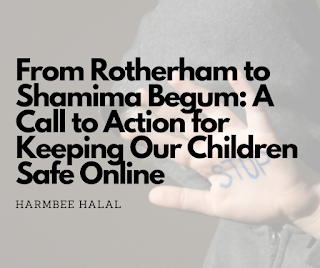Hearing about events like Shemam Begum's and the Rotherham tragedy breaks my heart as someone who is deeply concerned about the well-being of children.
It is terrifying to think that there are individuals in our society ready to exploit vulnerable children for their own selfish desires, and it is even more disturbing to consider that organisations that should protect these children, such as law enforcement and religious institutions, are willing to do so.
Rotherham tragedy which resulted in the sexual and physical abuse of 1400 children, is a classic example of institutional neglect and failure. Child protection officers have known about the atrocities for decades but have gone unpunished because the local police department was unable to deal with the matter. It is sad that so many children have suffered at the irresponsible actions of those who are meant to protect them. This is unacceptable.
In Britain the individuals who are meant to look out for our children may mistreat and harm them much like what happened to Shemam Begum. She was brought up and subjected to brainwashing as a kid a child which ultimately caused her to join the Islamic State in Syria. The fact that she was weak and deceived and that those who were supposed to care for her and prevent her from going to extremes failed to do so should not be overlooked despite the fact that her acts are unrepentant.
A deeper investigation is required for these institutions, such as law enforcement authorities, religious groups, and child protection agencies, to be prepared for cases of child sexual abuse and sexual neglect. The very nature of overlooking this leads them into extremist groups and ideologies that are out of context with true religious beliefs. Those who have failed to protect children must be made accountable for their acts. Not only is this a national security issue it's also an issue that needs to be addressed by the religious community and organisations of this country.
As I sit down to write this blog, I cannot help but feel a strong sense of frustration, anger, and bitter disappointment. For almost 15 years between 1997 and 2013, the children of Rotherham were subjected to unfathomable atrocities, with accusations of child sexual exploitation and abuse being ignored and neglected by people in positions of authority. The police force in Rotherham was ill-equipped to cope with such a pervasive problem, and institutional inadequacies meant that the extent of the problem was not recognized until it was too late.
As fathers and mothers, single parents, we need to listen to our children's tears and be more observant of what they are feeling as teenagers. It is natural for us to be curious about everything, including religion. However, we need to nurture an understanding that extremism is not acceptable. I, too, was born a British Muslim, and I remember having the urge to do this and that. But I also saw how easily extremist understanding can take root if it is not nipped in the bud.
Lee Rigby is not an isolated case. A new-born Muslim rejected by his Christian household because of extremist ideologies came to him. Whose fault is that? Every parent in the world should be pleased for their children, whatever religion they choose to follow. How dare you ignore that? Whether you are a pastor or preacher, you should have known better. If you truly followed the teachings of the Bible, Lee Rigby would be alive with his family today.
All new-born Muslims should not just be observant of the problems of the Muslim world but rather nurture themselves by understanding the true meaning of Islam and practicing it perfectly. Let us work together to create a world where such atrocities never happen again.
It is time to ask some probing questions. What may have caused this? How could so many people have turned a blind eye to these children's sufferings? What sort of society do we live in when the most vulnerable people of our community are not secure and those who are entrusted to protect them fail them so miserably?
Particularly religious institutions must do more to address this issue. All sacred writings underline the necessity of protecting children, and religious leaders must stand up and take action. According to the Quran, "anyone harms a believer destroys the Prophet himself." The Bible also emphasises the necessity of child protection, with Jesus saying, "Let the little children come to me, and do not impede them, because the kingdom of heaven belongs to such as these." It is past time for all religious organisations to take these words to heart and do all possible to keep youngsters safe.
But, it is not only religious institutions that must do more. The government must accept responsibility for what occurred in Rotherham cases like Shamima Begum. It is inexcusable that individuals in positions of authority were permitted to ignore their responsibilities for so long, with such disastrous results for so many children. As a society, we must expect more from those who are supposed to represent and safeguard us.
The terrible events in Rotherham and the mishandling of the case have left me feeling a mix of disappointment, fury, and deep sadness. They serve as a stark reminder of how vulnerable children are often failed by our society, religions, governments, and law enforcement agencies. It's a problem that extends beyond physical communities and into the online world, where young people are at risk of online grooming for sexual exploitation and radicalisation.
That's why quality education that equips young people with the tools they need to stay safe online is essential. We must prepare our children and young people to use online technology safely and appropriately by developing their digital resilience and critical thinking skills. It's through education and awareness that we can work together to prevent these atrocities from happening again.
But it's not just up to educators to tackle this issue. We all have a responsibility to raise awareness of the global problem of online grooming and work towards creating strong, supportive communities that can identify and respond to the needs of our most vulnerable young people. Together, we can take a stand and vow that we will never let such horrors happen again.



.png)




0 Comments